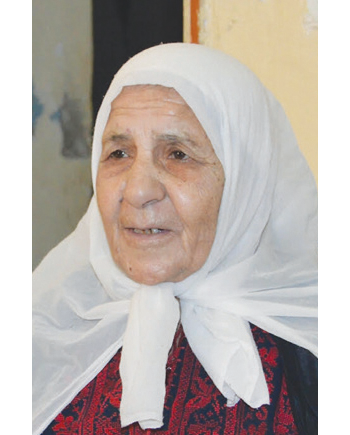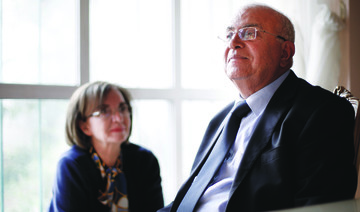RAMALLAH: As Palestinians worldwide mark the Nakba today, the Palestinian catastrophe of 1948, Sara Al-Hilwa clearly remembers the day that changed her life.
“My father came home with a truck. My parents had heard of the Deir Yassin massacre, and were afraid the Jews would come to us next. We took whatever we could, and drove off,” the 76-year-old said, as she sat at her current home — a simple bedroom in Al-Amari refugee camp, south of Ramallah.
Sara Al_Hilwa’s family was not alone as more than 710,000 Palestinians fled or were expelled from their villages and cities over the following days. Some fled to Lebanon and Syria, others to Jordan or Gaza. Palestinian society has never been the same since. Now, 70 years later, many still have makeshift lives in refugee camps all over the Middle East.
The uprooting is an open wound still for Palestinians. While doing academic research in the dense refugee camps in Gaza, Norwegian social anthropologist Dag Tuastad noticed a pattern in how the communities had come to terms with their lost society: “Around two thirds of the refugees chose to marry people from their original village or city.
“While families or clans are not so large in the refugee camps, decades later they still had a mechanism for maintaining their identity.”
Palestinian leaders promised the refugees the day would come when they would all be able to return home to what is today Israel. In many Middle Eastern countries, such as Lebanon, Syria and Jordan, refugees endured discrimination, on the grounds that they were temporary residents. But after lifetimes spent in simple housing, devoid of hope, many refugees today feel manipulated by their leaders, and accuse them of selling them illusions.
“It is just empty talk,” said Hajjem Yousef Mahadi, a 74-year old refugee, also in Al-Amari camp, who came originally from the city of Lydda. After decades living as a temporary refugee, she no longer believes that she will ever return home. She, too, remembers the day she was uprooted.
What she did not know at that time is that her fate, alongside that of tens of thousands of others, had been sealed with a simple, dismissive wave of a hand.

Sara Al-Hilwa, in Al-Amari Camp
After Lydda fell in July 1948, military commander Yigal Allon turned to David Ben-Gurion, Israel’s first Prime Minister, and asked what do to with the local population. Ben-Gurion said nothing, but merely waved his hand in a wordless gesture that everyone seemed to understand. Soon Yitzhak Rabin, who was to win a Nobel prize later, wrote the formal order: “The inhabitants of Lydda must be expelled quickly, without regard to age.”
Sara’s family was among the exodus from the city, embarking on a long march to the West Bank.
“We got on a cart, and a mule pulled us, slowly, with lots of others in front of us and behind us,” she said. The expulsion from Lydda, which is now next to Israel’s Ben Gurion International Airport, was one of the largest of the 1948 war.
The growing feeling among refugees today of having been sold illusions is understandable: Recent leaks from the official Palestinian negotiation teams confirm that the Palestinian leaders gave up demanding a return to what is today Israel.
According to the so-called Palestine Papers, a collection of 10,000 documents from the Palestinian negotiating team that were leaked to Al Jazeera and the Guardian newspaper in 2011, the Israelis and the Palestinians were negotiating the return of only about 10,000 of the around five million refugees to their homes.
For Ghassan Khatib, a former Palestinian government minister, the Nakba is not only about the refugees.
“The Nakba is the turning point for all Palestinians. Commemorating the Nakba is about taking a stand for resistance, and in particular for self-determination and statehood,” he told Arab News.
“For Palestinians, the Nakba is also a continuing affair that only started in 1948, but continued through 1967 and until today, with Jerusalem,” he said.
As Palestinians commemorate the Nakba, the US, under President Donald Trump, has moved its embassy from Tel Aviv to Jerusalem.
“You see, it never ended,” Khatib said of the highly contested diplomatic move.
Now, 70 years on, a handful of the refugees are still around to tell their stories. While Palestinians still do not have their own state, museums have sprung up in the self-rule area of the West Bank dedicated to telling the Palestinian story, and keeping memories of the Nakba alive.
Just north of the Birzeit University is the Palestinian Museum, functioning like a national museum. Children are bussed from all over the West Bank to the $24 million complex. Currently the main exhibition shows hand-made embroidered clothes by Palestinians.
“Look, this is from Gaza in 1935, and you can see how the cypress trees are part of the embroidery pattern. You had a lot of cypress trees in Gaza,” said museum guide Hannah Eusheid. “This one here is from Hebron in 1920, with its famous grapes in the pattern,” she said as she showed us around the colorful exhibition hall.
Visitors hear how traditional embroidery was affected by the Nakba. People had less money, so it was harder tot get hold of the necessary fabrics. Today embroidery has become a visual symbol of Palestinian identity, often featuring in Palestinian nationalist posters.
“Through embroidery we see how the Nakba changed our society. There is no doubt, preserving the Nakba is part of the story,” she said.
For the elderly refugees, who once wore the embroidery, there is little chance of ever returning to the homes the patterns celebrate. While the Palestinian struggle for independence continues, this year’s Nakba commemoration has become a moment for introspection.
With a Palestinian state nowhere on the horizon, Palestinian leaders are seen as increasingly corrupt and disconnected.
“We haven’t had elections, we haven’t seen a renewal of our leadership,” Khatib said. The main problem, however, he said, rests with the Israeli side.
The Palestinian leadership gambled on the peace process, which failed. The failure of the peace process created the gap seen today between the Palestinian leadership and the people.
There is no hope on the horizon. With war and tension in neighbors such as Syria, Iraq and Iran, Arab states seem less supportive of the Palestinians. For the first time since 1948, the Arab-Israeli conflict no longer seems to be the most urgent matter facing the Middle East.
In the Al-Amari camp outside Ramallah, Sara’s son, Khaled, should have had a bright future. Strong and handsome, but the 40-year old is also jobless, having been shot not twice in the legs by Israeli soldiers.
He spends his days watching Palestinians in Gaza demonstrating by the border near Israel, seeing the young people running towards Israeli bullets. As Israel has cut the Gazans off from the rest of the world, and Hamas runs an ever more oppressive regime, Khaled said he understands the protesters.
“The world must understand, these people have reached the point where death is better than life,” he said.

























